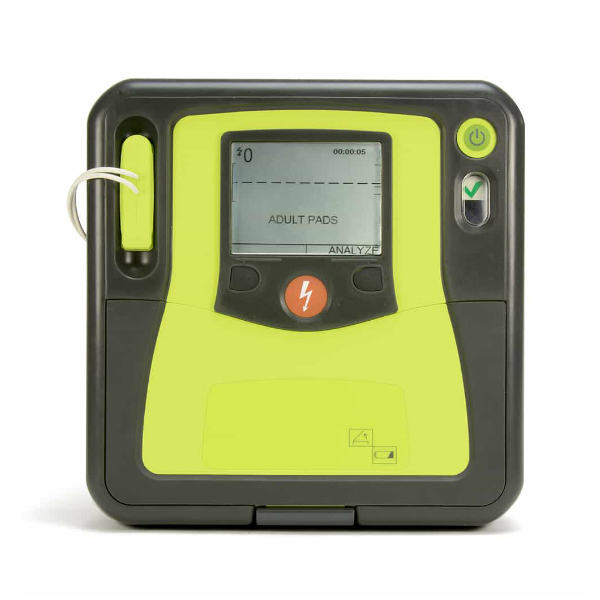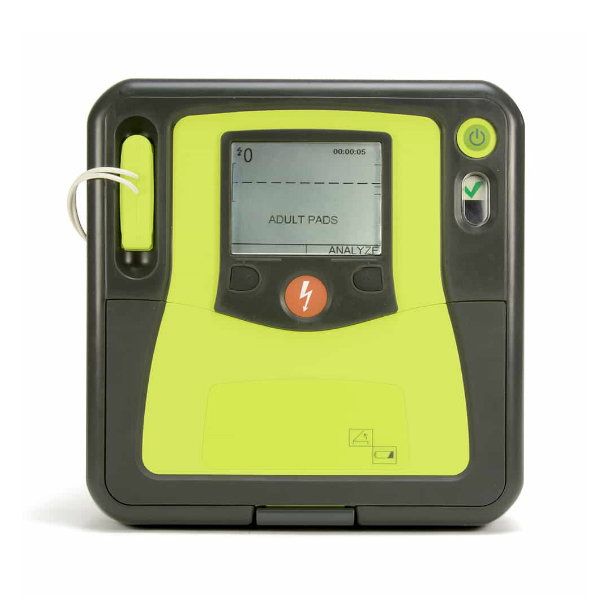SEMI-AUTOMATED EXTERNAL DEFIBRILLATOR (AED Pro), manual, eng
Valid Article
SEMI-AUTOMATED EXTERNAL DEFIBRILLATOR (AED Pro)
Definition
A portable electronic device designed to automatically detect cardiac arrhythmias (ventricular fibrillation/pulseless ventricular tachycardia) in a sudden cardiac arrest (SCA) patient, after which it audibly/visually instructs an operator to enable it to activate defibrillation of the heart through application of electrical shocks to the chest surface. The device is intended to be operated by a trained person. It consists of an external pulse generator (EPG) and a pair of skin-adhesive electrodes to monitor the rhythm and deliver the shocks; it also includes internal rechargeable batteries for energy that must be charged when not in use.
Specifications
DEVICE
- Semi-automatic or manual defibrillation for adults or children:
- adults: biphasic energy 120-150-200 J
- children (automatic switch when paediatric electrodes are plugged in): 50-70-85 J
- Defibrillation modes
- Semi-automatic defibrillation mode with CPR monitoring
- Manual defibrillation mode
- Semi-automatic defibrillation mode with CPR monitoring and manual override
- Automatic charge control if shock is recommended based on the analysis
- Built-in defibrillator self-test
DEFIBRILLATOR
- Waveform: ZOLL Rectilinear Biphasic waveform
- Energy selection: Configurable preset energy levels for adult and pediatric patients in
- Three-shock stacks
- Charging time < 10 seconds
- Charge hold time
- Semi-automatic mode: 30 seconds
- Manual mode: 60 seconds
DEFIBRILLATION ELECTRODE PADS
- ZOLL single-use, pre-gelled electrode pads:
- CPR-D-padz (includes CPR sensor)
- CPR Stat-Padz (includes CPR sensor)
- Adult Stat-Padz II
- Pediatric Pedi-Padz II
- Electrode connection indicator
ECG MONITORING
- ECG lead II
- Heart rate range: 30 to 300 beats per minute
- Heart rate alert:
- Configurable low heart rate limit in the range 30 to 100 beats per minute
- Off
- Heart rate alarm: Voice and text prompt indicates activated/deactivated status.
- Tachycardia: 250 bpm
- Bradycardia: 30 bpm - 100 bpm, user selectable
VISUAL AND AUDIBLE PARAMETERS
- LCD display, high resolution (320 x 240 px) with background lighting:
- Passed time
- ECG gain and rhythm
- Heart rate and heartbeat symbol
- Chest compression range gauge
- Number of delivered shocks with symbol
- Mode
- Text message
- Functional key labels
- LED flashing light for device ready and service status (including battery status)
- Speaker for spoken instructions (adjustable volume)
Quality standards
Components
- 1 x DSA AED PRO MODE MANUAL OVERRIDE English AEDPRO-EN-DM-C
- 2 x SUREPOWER BATTERIE, LI-ION 3 CELL 8019-0535-01
- 1 x CHARGER for batteries SUREPOWER 8200-000100
- 4 x ELECTRODE CPR-D PADZ monobloc 8900-0800-01
- 3 x ELECTRODES PEDI PADZ II pair 8900-0810-01
Differences between Defibrillation Electrode Pads including CPR functionality: CPR-D padz vs CPR stat padz.
The difference is in the shape of the electrodes:
- CPR-D padz is a monobloc pad with a central piece facilitating the positioning of the pads.
- CPR stat padz are two electrodes (one in the shape of a rectangular and the second one in the shape of circle) to be placed as indicated on the package.
MSF has selected the CPR-D padz as the standard configuration. If CPR stat padz are required by the field, they must be ordered separately.
Technical specifications
- Operating conditions
- operating temperature: 0° to 50°C
- relative humidity: 10 to 95%, non condensing
- altitude: -91 to 4573m, pressure: 768 to 429 mmHg; 1024 to 572 millibars
- Battery pack rechargeable Li-ion batteries, 10,8V
- recharge time: 4 hours
- operating time: 400 discharges at max energy 200 joules or 19 hours of continuous ECG monitoring
- Protection against electric shock
- Class II
- Type CF equipment protected against defibrillation discharges.
- All patient connections are electrically isolated.
- Protection against solid/ liquid ingress: IP55
Dimensions
- Dimensions: 76 x 235 x 239 mm
- Weight: 2.7 kg with battery pack
Transport Dangerous Goods
- UN3481 Lithium ion batteries contained in equipment
- Class: 9
- Packing Instructions: 967 Section II
- The label must include the UN code of the battery + an emergency number to contact in case of an incident
- Limit per package:
- Pax A/C (Passengers & Cargo Aircraft) = 5 kg
- CAO (Cargo Aircraft Only) = 5 kg
Supplied with the Article
| MSF CODE | MSF DESIGNATION | Qty |
| EEMDDEFS901 | (defibrillator AED Pro) BATTERY rechargeable 8019-0535-01 | 2 |
| EEMDDEFA901 | (defibrillator AED Pro) BATTERY CHARGER, 8200-000100 | 1 |
| EEMDDEFC901 | (defibr.AED Pro) ELECTRODE CPR-D padz, adhesive, adult, pair | 4 |
| EEMDDEFC902 | (defibr.AED Pro) ELECTRODE pedi padz II, adhesive,child,pair | 3 |
ATTENTION: The MSF Code EEMDDEFE9E- is for an defibrillator configured at manufacturing stage in ENGLISH. If the defibrillator is aimed for a french-speaking country, please order the EEMDDEFE9F-
To be Ordered Separately
- EEMDDEFC903 ELECTRODE CPR Stat-Padz, adhes.,adult,pair
- EEMDDEFC904 ELECTRODE Stat-Padz II, adhes.,adult,pair
Instructions for use
Equipment intended for the management of cardiac arrests by medical or paramedical staff who is trained in this technique. Reserved for emergency room, operating theatre or intensive care unit.
Read the instructions manual carefully.
On-screen and verbal instructions prompts to support user through all the process (English or French mode depending on the selected configuration).
- In semiautomatic mode, the AED Pro unit is intended to be used by rescuers and emergency care personnel who have completed training and certification requirements applicable to the use of a defibrillator where the operator controls delivery of shocks to the patient.
- In manual mode, the AED Pro unit is intended to be used only by qualified medical personnel trained in Advanced Life Support skills.
- In ECG monitoring mode, the AED Pro unit is intended to be used by personnel who are qualified by training in the use of the AED Pro device, basic life and/or advanced life support, or other physician-authorized emergency medical training.
The CPR monitoring (Cardiopulmonary resuscitation) fuction is intended for patient over 8 years old or > 25kg.
Precautions for Use
Follow the usual safety rules related to the use of a defibrillator (no interference between patient and staff during defibrillation, etc.)
Do not use the unit near oxygen-rich atmospheres, flammable anesthetics, or other flammable agents (such as gasoline). CAUTION: If High flow oxygen device (AirVo or CPAP) are operating in the area of defibrillation; Risk of inflammation.
Maintenance
RECHARGEABLE BATTERY
- Rechargeable battery packs require a full recharge AFTER EACH USE.
- The CHANGE BATTERY warning appears after 200 maximum-energy discharges.
- Base your replacement schedule for rechargeable battery packs on anticipated use patterns and battery pack testing results. Maximum replacement frequency every 18 months.
- ZOLL battery packs are designed to be charged in ZOLL chargers (included in the composition of the purchase of a new defibrillator)
Storage
Store between -30° and 70°C
MSF requirements
Alternative for the STD Schiller defibrillator that is facing supply issues.
Semi-automatic device that can be used in automatic mode by paramedical staff or according to the ECG analysis by qualified physicians.





![[KMEDKHIE2CO] ICU, PART medical equipment, 4 beds/2 months, complete](/web/image/product.template/574421/image_256/%5BKMEDKHIE2CO%5D%20ICU%2C%20PART%20medical%20equipment%2C%204%20beds-2%20months%2C%20complete?unique=0c2c557)
![[KMEDKHAE1CO] ADVANCED MEDICAL POST, PART equipment, complete](/web/image/product.template/572972/image_256/%5BKMEDKHAE1CO%5D%20ADVANCED%20MEDICAL%20POST%2C%20PART%20equipment%2C%20complete?unique=0c2c557)
![[KMEDKHAS2CO] AMP, PART medicines & renewable supplies, complete](/web/image/product.template/572649/image_256/%5BKMEDKHAS2CO%5D%20AMP%2C%20PART%20medicines%20%26%20renewable%20supplies%2C%20complete?unique=32ffd6b)
![[KMEDKHOE1CO] OPERATING SUITE, PART med.equip. 2 operating rooms, complete](/web/image/product.template/572536/image_256/%5BKMEDKHOE1CO%5D%20OPERATING%20SUITE%2C%20PART%20med.equip.%202%20operating%20rooms%2C%20complete?unique=600fae4)
![[KMEDKHWE1CO] WARD, PART medical equipment ward 20-40 beds, complete](/web/image/product.template/573288/image_256/%5BKMEDKHWE1CO%5D%20WARD%2C%20PART%20medical%20equipment%20ward%2020-40%20beds%2C%20complete?unique=600fae4)
![[KMEDKHAX3OP] AMP, PART COMPLEMENT if electricity, complete](/web/image/product.template/572647/image_256/%5BKMEDKHAX3OP%5D%20AMP%2C%20PART%20COMPLEMENT%20if%20electricity%2C%20complete?unique=cdfc081)
![[KMEDMHEE321D] (mod emergency) COMPLEMENTARY RESUSCITATION EQUIPM. RTR 2021](/web/image/product.template/574353/image_256/%5BKMEDMHEE321D%5D%20%28mod%20emergency%29%20COMPLEMENTARY%20RESUSCITATION%20EQUIPM.%20RTR%202021?unique=413aa96)
![[EEMDDEFA901] (defibrillator AED Pro) BATTERY CHARGER, 8200-000100](/web/image/product.template/578057/image_256/%5BEEMDDEFA901%5D%20%28defibrillator%20AED%20Pro%29%20BATTERY%20CHARGER%2C%208200-000100?unique=7995f43)
![[EEMDDEFC901] (defibr.AED Pro) ELECTRODE CPR-D padz, adhesive, adult, pair](/web/image/product.template/578058/image_256/%5BEEMDDEFC901%5D%20%28defibr.AED%20Pro%29%20ELECTRODE%20CPR-D%20padz%2C%20adhesive%2C%20adult%2C%20pair?unique=fc5e6bb)
![[EEMDDEFC902] (defibr.AED Pro) ELECTRODE pedi padz II, adhesive,child,pair](/web/image/product.template/578059/image_256/%5BEEMDDEFC902%5D%20%28defibr.AED%20Pro%29%20ELECTRODE%20pedi%20padz%20II%2C%20adhesive%2Cchild%2Cpair?unique=fc5e6bb)
![[EEMDDEFC903] (defibr.AED Pro) ELECTRODE CPR Stat-Padz, adhes.,adult,pair](/web/image/product.template/578055/image_256/%5BEEMDDEFC903%5D%20%28defibr.AED%20Pro%29%20ELECTRODE%20CPR%20Stat-Padz%2C%20adhes.%2Cadult%2Cpair?unique=34e3363)
![[EEMDDEFC904] (defibr.AED Pro) ELECTRODE Stat-Padz II, adhes.,adult,pair](/web/image/product.template/578056/image_256/%5BEEMDDEFC904%5D%20%28defibr.AED%20Pro%29%20ELECTRODE%20Stat-Padz%20II%2C%20adhes.%2Cadult%2Cpair?unique=7995f43)
![[EEMDDEFS901] (defibrillator AED Pro) BATTERY rechargeable 8019-0535-01](/web/image/product.template/578054/image_256/%5BEEMDDEFS901%5D%20%28defibrillator%20AED%20Pro%29%20BATTERY%20rechargeable%208019-0535-01?unique=7995f43)